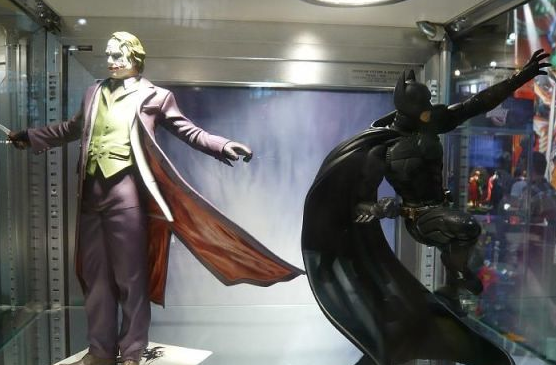The Dark Knight
 Wednesday, July 23, 2008 at 2:39PM
Wednesday, July 23, 2008 at 2:39PM 
There are films and then there is cinema. The difference is not in the degree or strength of the entertainment. The fundamental difference is in the script, in the writing. Juno was such a film, differentiated largely by the superb cadence of its dialogue, but its narrative simplicity worked against it being anything more than a momentary, although quite pleasurable experience.
The Dark Knight is cinema, driven forward not only by a script that is as rich in literary references as it is suffused by moral dilemmas, but also by the director Christopher Nolan's profound understanding of visual storytelling. In between explicit references to 9/11, terrorism and George W. Bush, Dark Knight develops an argument, in collage/montage form, about the moral implications of violence practiced not so much by those who are evil, but by those who are stewards of the law.
When the cinema works, pleasure and shock co-exist in an almost continual tension with plot, images and sound. I found myself floating in and out of the film, racing to solve its problems and yet at the same time challenged by its brutality. This is not a film with a main character in the traditional Hollywood sense. Batman is a conduit for the fears and hopes of a population. The essence of this film will be found in its philosophical dilemmas — sounds strange, but in a quite self-conscious manner, Nolan asks us all to face the consequences of our own reactions to the arbitrary death of loved ones. But, can death be anything other than arbitrary?
When (as he often does) the 'Joker' laughs about chance, he is laughing at the rather blind reaction of people to the dystopia they share. Blind because it is in the character of a dystopia to be unable to see solutions and it is precisely the purpose of terrorism to cloud people's judgments about the future.
Given the circumstances, events and challenges of the last decade, the clear lack of a moral centre to so many of the choices made by so many different governments and the ever-present threat of terrorism, it is not surprising that Batman who is ultimately good, becomes an outcast. It is also not surprising that Nolan casts the Joker as the ultimate incarnation of what terrorism has come to mean since 9/11.
Terrorism is by its very nature without morality. It is an ethical black hole. Dark Knight explores what happens when that black hole sucks "good" people into its orbit and how they deal with the pain of loss.
At its heart the film explores the relationship between ideology and action, between closed systems of thought and the messy space occupied by democracy and its institutions. It is as critical of the police as it is of politicians, but always in the spirit of choice. We get to choose when the criticism means something and when it is arbitrary.
Nolan is so smart that he reconstructs the assassination of John F. Kennedy, in this case a speech by the Mayor, so that the shots that ring out from a book depository- type building melt into the chaos of a violence that has become viral. But, he also asks when does violence become foundational to our everyday thoughts and what happens when people no longer distinguish between morality, law and anger?
The key to the 'Joker' is his disguise and the fact that he believes he knows what is wrong not only with those he kills but with those who fight him. In a series of monologues that sound like they have come from a drunken sailor, the 'Joker' builds his rationale for the fall of human beings from any state of grace.
In the end, however, faced with the moral dilemma of choosing to kill others to save themselves, the 'Joker's' test subjects (who are on two different boats) choose life even at the cost of their own deaths.
This redemption sets the stage for Batman to become the ultimate outcast, a man whose goodness must be distorted so that he can become yet again the conduit for order and law. He takes the blame for everything that has gone wrong with all of the Christian overtones that that suggests.
A must see. A different opinion about the film can be found here.
Note: For anyone tired of dystopias and death and terror and war and oil prices and a decaying environment and so on, go to Mama Mia.
PS
Also watch this video


